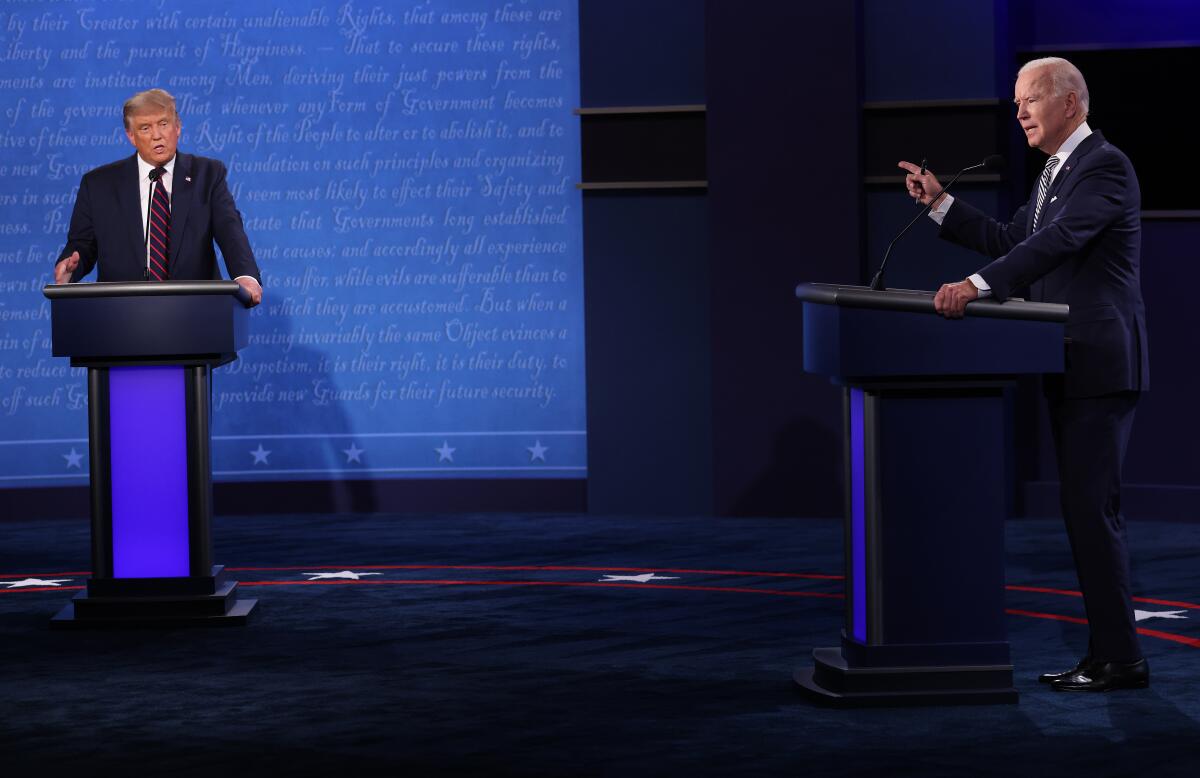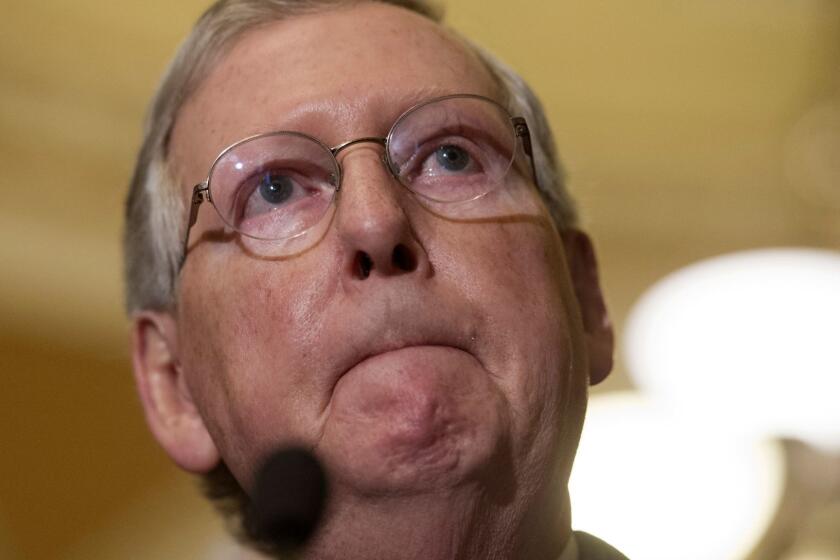Among the debate casualties: Serious discussion of climate change

- Share via
The gravest risk our nation faces is global warming, a burgeoning crisis so dire that if we don’t act decisively and immediately to radically reduce the greenhouse gases we emit into the atmosphere, we will consign ourselves to an increasingly inhospitable world.
So how much of Tuesday’s presidential debate, the first of three scheduled showdowns in the 2020 election between President Trump and Democratic challenger Joe Biden, was devoted to the issue? Maybe 10 minutes of squabbling over forest management and the economic impacts of Biden’s proposals.
That’s not nearly good enough.
Though in truth, there wasn’t much substantive discussion about anything during the debate, which Trump approached more like Godzilla wading through Tokyo than a president trying to defend a four-year record.
The Trump team, like the president himself, is working aggressively to make voters disbelieve what they see and hear from Joe Biden at the first debate.
It’s also true that in the near term the most dire threat to the nation is the possibility of another four years of a president who spent his first term undermining the structures of government, bulldozing through our systems of checks and balances, and exploiting social fissures to drive the nation further apart while giving cover to racists and xenophobes.
But if we don’t act decisively, and now, to supplant our reliance on fossil fuels for energy with renewable sources, these other political debates, while significant in the moment, will pale in meaning. As sea levels rise, as wildfires become more extreme, as hurricanes and other major storms intensify and as climate change significantly alters the habitability of large areas of Earth, we’ll long for the days when abortion rights, income inequality and access to healthcare stood as the most significant issues before us.
You’d think, then, that climate change would be a top priority for these debates. But no.
And even when it was raised Tuesday by moderator and Fox News anchor Chris Wallace, the discussion was, to put it mildly, not very informative. Here’s a representative snippet:
Chris Wallace: Let him go for a minute, and then you can go.
Trump: And rebuild the building.
Biden: No.
Trump: It’s the dumbest-
Biden: That is not —
Trump: ... most ridiculous [crosstalk] where two car systems are out —
Biden: Not true —
Trump: … where they want to take out the cows too.
Biden: Not true.
Trump: That’s not true either, right?
Biden: Not true.
Trump: This is a 100 trillion —
Biden: Simply… Look —
Trump: That’s more money than our country could make in 100 years [crosstalk]
Biden: That is simply not the case.
So edifying.
Tuesday’s format followed the traditional set-up of a moderator serving up questions and acting as the timekeeper for the two candidates. Under the rules set by the Commission on Presidential Debates, the moderator picks the topics for discussion. Wallace devoted a few of the roughly 30 questions he asked to the topic of climate change.
The second debate, scheduled for Oct. 15 in Miami, will be a town hall format, which suggests climate change might get more attention given the grave risk Florida faces from both rising sea levels and hurricanes.
The topics for the third debate, set for Oct. 22 in Nashville and moderated by NBC News’ Kristen Welker, won’t be announced until a week or so beforehand. Environmental groups have been advocating for a more prominent role for climate change during the debates, but they shouldn’t hold their collective breath. Democrats have a better understanding of the threats posed by climate change, but even in their primary debates the topic didn’t get much attention.
Four years ago, Senate Majority Leader Mitch McConnell didn’t believe a president in the final year of his term should appoint a new Supreme Court justice. How about now?
Would a direct confrontation over climate change make much of a difference to voters? It’s hard to say, given that the candidates’ opposing views are well known.
Trump famously questions the science of global warming, at one point dismissing it as a hoax perpetrated by the Chinese for some imagined trade advantage. When asked Tuesday if he believes human activity contributes to global warming, he said, “I think to an extent, yes,” a small concession that counts as progress for this president. Yet since becoming president, he has worked to undo reams of environmental regulations while seeking to radically expand oil and gas drilling and production in an effort to make the U.S. the dominant player in what Trump fails to realize is a fast-receding industry.
Biden, for his part, acknowledges the dire threat climate change poses not just to the U.S. but to the world, recognizes the links between climate change and environmental justice, and has vowed to restore the U.S. as a global leader in the effort to wean the world from fossil fuels in favor of renewable energy sources.
There may not be many minds to be persuaded on the issue. But that doesn’t mean the candidates should get a pass on debating the most important challenge humankind faces. That’s not to diminish the other significant issues the nation confronts, including racial and economic equality, reliable access to affordable healthcare, a more stable economy and a more peaceful world.
But if we continue down this path of disrupting the global climate, collapsing ecosystems, spurring mass human migration and further destabilizing global political structures — well, there won’t be much of a world left to debate over.
More to Read
A cure for the common opinion
Get thought-provoking perspectives with our weekly newsletter.
You may occasionally receive promotional content from the Los Angeles Times.











